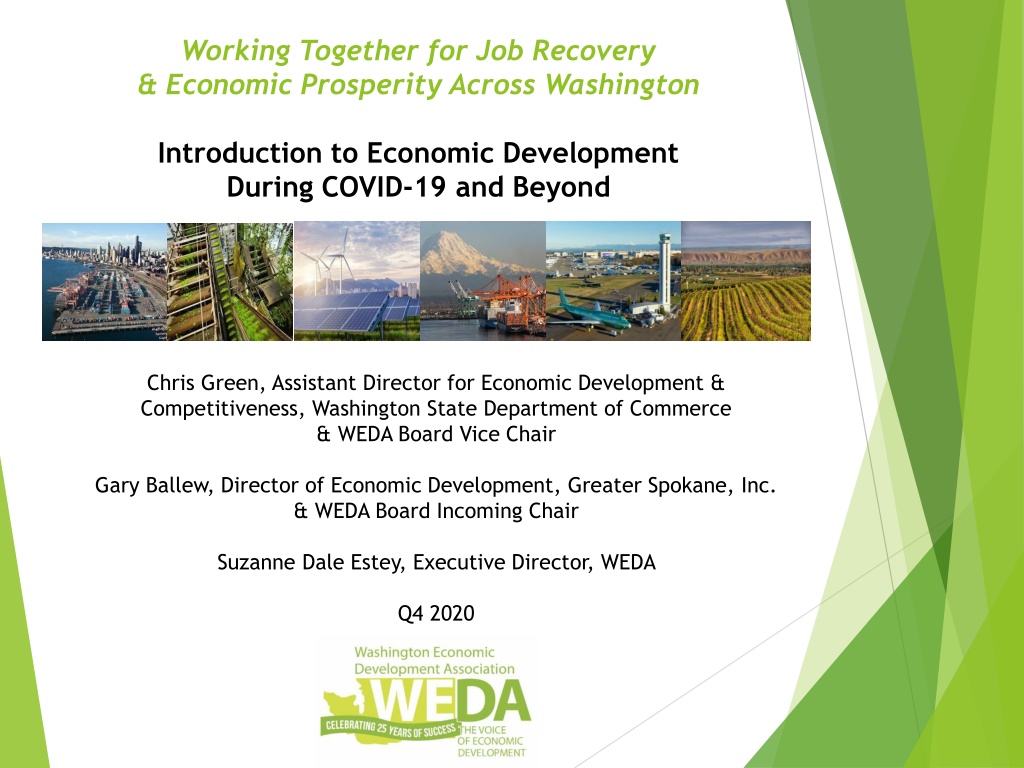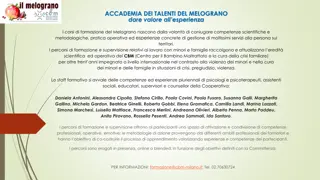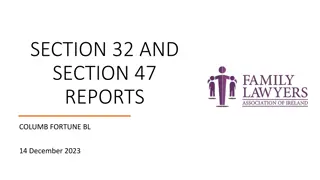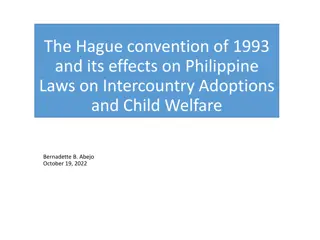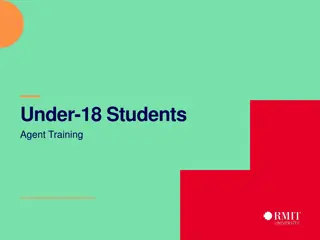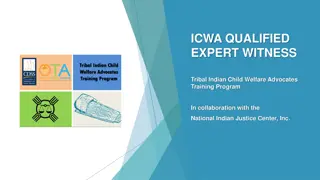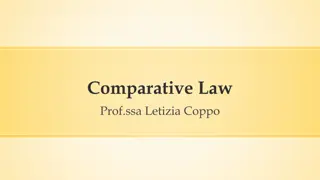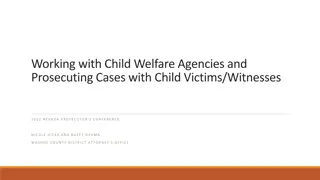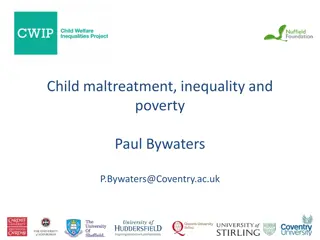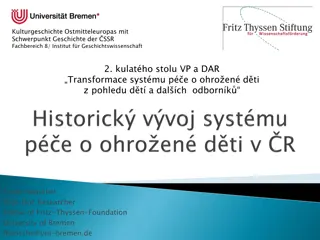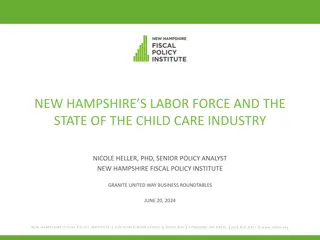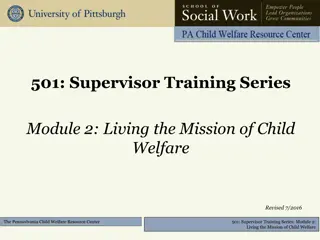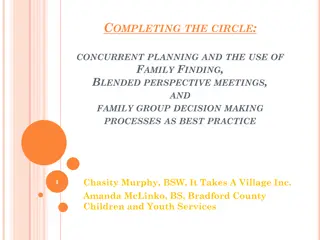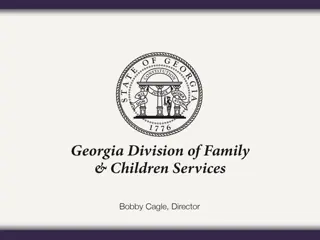Overview of New Federal Child Welfare Law
Federal Child Welfare Law formerly known as Bill C-92 aims to address historical injustices and over-representation of Indigenous children in care. This law, implemented in 2020, is the outcome of a complex process involving national organizations and Indigenous communities in developing legislation. The slides provide insights into the law's background, immediate context, and the challenges faced during its creation. For comprehensive information and legal advice, contact the author or a lawyer.
Download Presentation

Please find below an Image/Link to download the presentation.
The content on the website is provided AS IS for your information and personal use only. It may not be sold, licensed, or shared on other websites without obtaining consent from the author.If you encounter any issues during the download, it is possible that the publisher has removed the file from their server.
You are allowed to download the files provided on this website for personal or commercial use, subject to the condition that they are used lawfully. All files are the property of their respective owners.
The content on the website is provided AS IS for your information and personal use only. It may not be sold, licensed, or shared on other websites without obtaining consent from the author.
E N D
Presentation Transcript
Working Together for Job Recovery & Economic Prosperity Across Washington Introduction to Economic Development During COVID-19 and Beyond Chris Green, Assistant Director for Economic Development & Competitiveness, Washington State Department of Commerce & WEDA Board Vice Chair Gary Ballew, Director of Economic Development, Greater Spokane, Inc. & WEDA Board Incoming Chair Suzanne Dale Estey, Executive Director, WEDA Q4 2020
Introductions About WEDA: Washington State s only trade association laser-focused on economic development. WEDA is committed to recovering, retaining, expanding and recruiting jobs and investment in Washington Our Strategic Goals since COVID-19: Creating an imperative to empower communities across Washington with tools to recover from the COVID-19 crisis, assisting employers large and small in rebuilding, becoming globally competitive and growing jobs, while supporting an equitable economy and inclusive economic development. We Believe: The time is now to rebuild our economic vitality, increase the resiliency of our economy, and strengthen the economic development ecosystem at state, regional and local levels. About Washington Commerce: Work with local governments, tribes, business and civic leaders to strengthen communities across our state Key Sector Strategy; Business Recruitment & Expansion; Small Business Services About Greater Spokane, Inc. and the State s Associate Development Organizations/Economic Development Councils 39 counties covered by 34 ADOs; public-private partnerships; conveners & catalysts; cluster-driven, confidential client focus
Defining Economic Development No single definition for economic development, and no single strategy, policy, or program for achieving successful economic development. Typically described in terms of objectives. Most commonly described as: creation of jobs and wealth, and the improvement of quality of life. Can also be described as a process that influences growth and restructuring of an economy to enhance the economic well being of a community. Economic development encompasses three major areas: Policies to meet broad economic objectives including inflation control, high employment, and sustainable growth. Policies and programs to provide services building infrastructure and providing assistance to the disadvantaged. Policies and programs directed at improving the business climate through specific efforts business finance, marketing, neighborhood development, business retention/expansion, technology transfer, real estate development. From: www.iedconline.org/clientuploads/Downloads/IEDC_ED_Reference_Guide.pdf
Defining Economic Development Harvard Professor Michael E. Porter: long-term process of building a number of interdependent microeconomic capabilities and incentives to support more advanced forms of competition. Wikipedia: Economic development generally refers to the sustained, concerted actions of policymakers and communities that promote the standard of living and economic health of a specific area. Such actions can involve multiple areas including development of human capital, critical infrastructure, regional competitiveness, environmental sustainability, social inclusion, health, safety, literacy, and other initiatives. Main goal: improving the economic well being of a community through efforts that entail job creation, job retention, tax base enhancements and quality of life. Communities differ in their geographic and political strengths and weaknesses. Each community will have a unique set of challenges and strategies for economic development.
Limitations on Economic Development in Washington Due to strict limitations in the Washington State Constitution, governments in Washington State have very few avenues open for direct participation in private economic development projects. State of Washington is one of the more restrictive in the nation on how public funds may be used to attract private investment. Potential legal issues regarding the loaning or gifting of public funds. Under Article 8, Section 7 of the Washington State Constitution, a city or county may not directly give or loan money to private businesses for economic development. Specifically, Article 8, Section 7 of the state constitution provides: No county, city, town or other municipal corporation shall hereafter give any money, property, or loan its money, or credit to or in aid of any individual, association, company or corporation, except for the necessary support of the poor and infirm. This constitutional provision, which is found in many state constitutions, has been interpreted in numerous cases and generally has been interpreted very narrowly in regard to allowable uses of public funds to aid private businesses or corporations. Some exceptions during COVID-19 due to emergency status. Washington Attorney General Opinions (March 17, 2020 and April 6, 2020)
Many Partners in the Economic Development Ecosystem Washington State Department of Commerce, including Industry Sector Leads Other State & Federal Agencies Associate Development Organizations/Economic Development Councils Ports (some are Associate Development Organizations) Counties Cities Tribes Universities Workforce development partners State industry cluster/trade associations (AFA, WTIA, LSW, WA Maritime Blue) Association of Washington Business, Washington Roundtable, local Chambers of Commerce, private businesses, banks and Community Develop. Financial Institutions Washington Small Business Development Center and US Small Business Administration Utilities & Railroads Other coalitions/regional EDOs/Economic Development Districts/MPOs Labor partners And many more: Visitor & Convention Bureaus, redevelopment agencies, Impact Washington, incubators
Economic Development Strategies Business Retention/Recovery & Expansion - #1 economic development activity Business Recruitment/Site Selection Industry Clusters Small Business Development Entrepreneurship/Venture Capital Economic Development Finance Incentives Downtown Development E-Commerce Infrastructure Real Estate Redevelopment Economic Development Marketing/Shop Local Campaigns Rural Economic Development Tourism Neighborhood Economic/Community Development Export/Trade Development Workforce Development Other: Regulatory/Business Climate Improvements, Quality of Life, Smart Growth, Sustainable Development, Brownfields
Common Local Government Economic Development Strategies Infrastructure Development - #1 economic development tool in Washington State Infrastructure may be in advance build it and they will come In response to an opportunity/project but will support other development Capacity building CERB/PWTF/LRF/EDA/.09 working on TIF Permit Streamlining/Permit Assistance Streamlining often identifies bottlenecks in process and removes Assistance helps proposed development meet codes Still have to meet all the rules Code Alignment Make sure local government goals align with local government codes Downtown Revitalization Most municipalities take action to encourage investments in their downtown
Business Retention/Recovery & Expansion Activities: COVID-19 and other grants Low interest loans purchase of buildings, new equipment Tax credits Use of zoning, permitting assistance Workforce training and assistance Industry cluster strategies Periodic surveys, interviews & visits/relationship building Benchmarking Quantitative Measures: Number of Jobs recovered/retained/created Number of Retained Businesses Number of Businesses visited; % of Jobs Held by Local Residents; Avg. Salary Qualitative Measures: Business perceptions of local government, community Involvement of assisted businesses in community/government
Business Retention/Recovery & Expansion Resources US Department of Commerce US Department of Commerce International Trade Administration US Small Business Administration Washington Small Business Development Centers Business Retention & Expansion International (BREI) Washington State Department of Commerce Local Associate Development Organization Washington Commerce Small Business Resiliency Partners Washington Business Hub
Business Recruitment/Site Selection Activities: Online marketing Trades shows Rapid response to data inquiries Leveraging of utility infrastructure Resources: Area Development Magazine Business Development Outlook Magazine Business Facilities Magazine Expansion Management Magazine Site Selection Magazine http://choosewashingtonstate.com/
Industry Clusters/Sectors Washington State Key Sectors Aerospace Agriculture & Food Manufacturing Clean Technology Forest Products Information & Communications Technology Life Science/Global Health Maritime Military & Defense Activities Shared workforce development strategies Attracting Research & Development funding Identifying gaps in ecosystem Leveraging investment/venture funding
Economic Crisis is Statewide US Rate: 7.9% WA State Rate: 7.4% Source: WA State ESD
Washington Commerce We strengthen communities HOUSING HOUSING HOMELESSNESS HOMELESSNESS INFRASTRUCTURE INFRASTRUCTURE BUSINESS BUSINESS ASSISTANCE ASSISTANCE ENERGY ENERGY PLANNING PLANNING COMMUNITY FACILITIES COMMUNITY FACILITIES CRIME VICTIMS & CRIME VICTIMS & PUBLIC SAFETY PUBLIC SAFETY COMMUNITY COMMUNITY SERVICES SERVICES
Washington Commerce Key Sector Strategy o Targeted industries that can spur rapid growth Business Recruitment & Expansion/choosewashington.com Business Development Team Foreign Investment & Export Assistance International Missions & Trade Shows Tourism Small Business Services Education Technical Assistance Entrepreneur Resources/StartUp Washington Business Grants & Loans Economic Partnerships & Economic Resiliency Partners o o o o o o
Key COVID-19 Resources Economic Recovery Dashboard www.coronavirus.wa.gov/ Working Washington Small Business Grants Round 2 Small Business Resiliency Assistance Nonprofit Grant Assistance Program County-by-County Business Resources Washington Small Business Development Centers AWB Rebound & Recovery Resources Manufacturing Industry Resources US Small Business Administration USDA Resources - Rural Development & Agriculture
WEDAs Top Priorities WEDA s advocacy focuses on the most critical actions policymakers can take to recover, retain and grow living wage jobs, foster vibrant communities, support equity and opportunity for all and spark investment across Washington State: Strengthen the Economic Development Ecosystem Foster Catalysts for Job Recovery & Growth Increasing Prosperity for All of Washington
Lets Connect Suzanne Dale Estey Executive Director Washington Economic Development Association 206-769-4217 suzanne@wedaonline.org www.wedaonline.org /WashingtonEconomicDevelopmentAssociation /company/washington-economic-development-association/ @WashingtonEcon1 Chris Green Assistant Director Washington State Department of Commerce 206-256-6146 chris.green@commerce.wa.gov Gary Ballew Vice President of Economic Development Greater Spokane, Inc. 509-321-3634 gballew@greaterspokane.org
